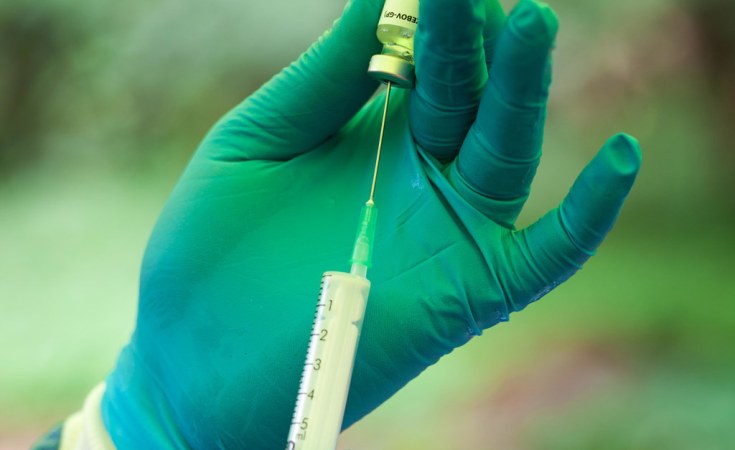Abuja — The National Agency for Food and Drug Administration and Control (NAFDAC) has granted registration approval for R21 Malaria Vaccine (Recombinant, Adjuvanted).
The vaccine is manufactured by Serum Institute of India Pvt. Ltd. (SIIPL).
Director General of NAFDAC, Prof. Mojisola Adeyeye, who addressed journalists in Abuja, yesterday, said the vaccine was for prevention of clinical malaria in children from five months to 36 months of age. The storage temperature of the vaccine is 2-8 °C."
She said: "NAFDAC in exercising its mandate as stipulated by its enabling law, NAFDAC Act CapN1, LFN 2004 is granting registration approval for R21 Malaria Vaccine (Recombinant, Adjuvanted) manufactured by Serum Institute of India Pvt. Ltd. (SIIPL).
"The Marketing Authorisation Holder's (MAHs) is Fidson Healthcare Ltd in line with the Agency's Drug and Related Products Registration Regulation 2021.
"The R21 Malaria vaccine is an Adjuvanted protein vaccine presented as a sterile solution. A dose which is 0.5ml is composed of R21 Malaria antigen 5µg and Matrix-M1 50µg as an adjuvant filled in a vial as ready to use liquid formulation for intramuscular injection.
"The vaccine is indicated for prevention of clinical malaria in children from 5 months to 36 months of age. The storage temperature of the vaccine is 2-8 °C."
Adeyeye said R21 Malaria vaccine was an Adjuvanted protein vaccine presented as a sterile solution.
She explained that a dose which is 0.5ml was composed of R21 Malaria antigen 5 mg and Matrix-M1 50 mg as an adjuvant filled in a vial as ready to use liquid formulation for intramuscular injection.
The vaccine is indicated for prevention of clinical malaria in children from 5 months to 36 months of age. The storage temperature of the vaccine is 2-8 °C.
NAFDAC boss said the agency has several pathways for registration of vaccine, adding that the pathways were in line with the NAFDAC's guideline for registration of Imported Drugs, Vaccines and IVDs under Collaborative Registration Procedure, or the Agency's guideline for registration of imported Drug and Vaccines.
She said the R21 Malaria Vaccine was reviewed using the later which involves full review of product dossiers.
"While granting the approval, the agency has also communicated the need for expansion of the clinical trial conducted to include a phase 4 clinical trial/Pharmacovigilance study to be carried out in Nigeria. "The brief on the approval of the R21 Malaria vaccine has been communicated to the Minister of Health and National Primary Health Care Development Agency for appropriate actions toward immunisation in the respective population," she said.
Adeyeye, said NAFDAC received the dossier of the R21 Malaria manufactured by the Serum Institute of India Pvt Ltd (SSPL) and was subjected to independent review at two levels. She also said as a matured regulatory agency, it was expected as part of global benchmarking that external advisory committee was in place to advise upon invitation on certain functions of the agency.
"As a new biological molecule that is being given consideration for full registration, the independent review by an external body becomes imperative as a means to further safeguard public health," he said.
The NAFDAC DG further explained that external advisory body - NAFDAC's Vaccine Advisory Committee (NEVAC) was made up of four highly recognised, well-published experts from Nigeria's tertiary institutions (Nnamdi Azikwe University, Awka, Anambra State; University of Lagos, Lagos State, University of Ibadan, Oyo State and Usman Dan Fodio University, Sokoto, Sokoto State).
She said the in-house NAFDAC's Vaccine Review Committee was a multi-disciplinary group extracted from the following NAFDAC directorates - Drug Registration and Regulatory Affairs, Vaccines/Biologics/Medical Devices; Drug Evaluation and Research (for Clinical trial/Good Manufacturing Practices inputs; Pharmacovigilance; Post-Marketing Surveillance, Central Drug Control Laboratory, and Port Inspection.
Adeyeye said essentially, the dossier was reviewed by NEVAC independently using standards of the World Health Organisation (WHO) across relevant domains, in addition to the ICH guidelines, European Medicines Agency guidelines (where appropriate), scientific rigor on the vaccine and the context of malaria generally and specifically to Nigeria and best research and manufacturing governance.
NEVAC members reviewed all sections independently using best review practices and met physically in plenary to assess and debate the reviews by sections, raised queries and made recommendations accordingly.
Overall, the assessment was scored as: Adequate (Fully compliant with standards), and the report was submitted to the Director General.
Speaking further, Adeyeye said the review of NAFDAC's Committee had always been guided by the same international standards and best practices with the same modality of independent review by members followed by long hours of plenary where rigorous assessment of each review took place.
She said the Committee also independently scored the assessment as Satisfactory and forwarded to the Director General.
The DG said the agency held a joint review session last Friday, which provided the opportunity for harmonising the assessments.
He said the R21 Malaria Vaccine dossier complied substantially with best international standards with which the dossier was benched-marked as mentioned above.
"The Joint Review Committee concluded that the data on the R21 Malaria vaccine were robust and met criteria for efficacy, safety, and quality. It was also adjudged that the vaccine's known and potential benefits outweigh its known and potential risks, thereby supporting the manufacturer's recommended use.
"The joint Review Committee was also interested in reviewing data of the human-malaria parasite dynamics of the 25 percent not covered to understand issues bothering on non-protection that could inform further research
"Specific instances where queries/ clarifications and or additional data were required have been duly compiled to the manufacturers.
"These did not affect the overall adequacy of the dossier. The Joint Review Committee recognised the importance of an effective malaria vaccine (with a 75% protection) as an additional interventional tool, as a critical need in Nigeria with the highest malaria burden.
"The Joint Review Committee also recommended additional phase 4 clinical trial/Pharmacovigilance study in-country in the implementation given the peculiarity and heterogeneous nature of malaria in Nigeria," she said.


